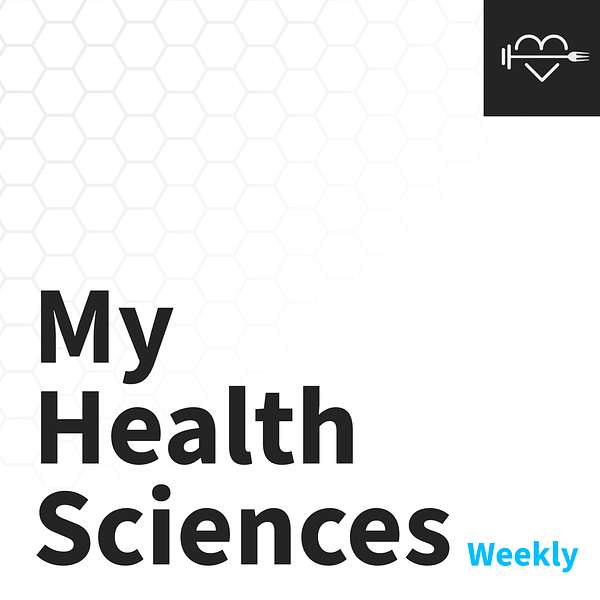
myHealthSciences Weekly
myHealthSciences Weekly
Why You Can’t Stop Eating
Today we have an opportunity unlike any other in history to eat the healthiest, most robust, nutrient-dense diet ever. The variety of whole foods available is unprecedented. Nutrition research is the most advanced. And yet we can’t help but get fatter and sicker by eating ourselves to illness. Here I’m going to detail why we can’t stop eating. Let’s get into it!
Watch the Video on YouTube
Full Article on the Website
---------------------------------------------------------------------------------------------
Free Health Kit and Newsletter Sign-up:
✅ Stream a Mobility Flow Workout
✅ Receive a Whole Foods Plant-Based Recipe
✅ Obtain the Top 10 Bedroom Sleep Tips
Get your free health kit and get subscribed to my weekly newsletter here.
Facebook | Instagram
I look forward to sharing my journey to healthier and happier!
-Brandon Zerbe
----------------------------------------------------------------------------------------
Disclaimers: I'm not a doctor, medical or financial professional. Just a dude posting videos on the internet. Please consult a professional before starting any program or new habit. Use of this information is strictly at your own risk. I will not assume any liability for direct or indirect losses or damages that may result from the use of information contained in this video including but not limited to economic loss, injury, illness, or death.
Today we have an opportunity unlike any other in history to eat the healthiest, most robust, nutrient-dense diet ever. The variety of whole foods available is unprecedented. Nutrition research is the most advanced. And yet we can’t help but get fatter and sicker by eating ourselves to illness. Here I’m going to detail why we can’t stop eating. Let’s get into it!
Is Sugar Addiction the Problem?
Any google search, nutritional documentary, or fitness influencer has likely told you about sugar addiction. Consumption of added sugar leads to cravings for more sugar. Over time, tolerance is built, and your consumption increases to receive the same pleasure. And ending this cycle is met with unpleasant withdrawal symptoms. A similar pattern found with many hard drugs. [1, 2]
But what’s less discussed is that this has been primarily found in animal models. The evidence in humans for sugar addiction at present is not as compelling [3]. And it may not even be relevant. Besides candy and soda, what foods are only high in added sugar? Few. It wasn’t difficult for me to eliminate candy and soda from my diet. And I don’t get much pleasure from eating a bowl of raw sugar either. There are many compelling arguments for cutting down the consumption of added sugar, but addiction may not be one of them. High sugar diets have been shown to be addictive in rats but so have high fat diets. [3, 4] And here’s the real problem.
Hyperpalatable Foods
You’re not eating sugar out of a bowl just like you’re not eating butter off a pan or salt out of the shaker. That’s gross. It’s just too concentrated to be pleasant. There’s a formula where the levels of saltiness, sweetness, and richness create the perfect balance. This has been coined the Bliss Point [5]. Combine the bliss points for salt, sugar, or fat with varying textures and tastes to get hyperpalatable foods. This is the core of the cafeteria diet. Foods engineered to stimulate appetite, delay satiety, and promote excessive energy intake [2]. This can be as addictive as drugs.
The variety of food available today that meets these requirements is alarming. Chips, pastries, granola bars, ice cream, fried foods, and sauces combine the bliss points of salt, sugar, and fat. The options are endless. Not only are these hyperpalatable foods addictive, but the variety itself has widely been studied as a promoter of increased food intake. Human nature has evolved to maximize the probability of nutrient intake by craving food variety. It’s why you may still have room for a brownie even after a filling steak dinner. But this behavior was developed when food was scarce. Today it’s abundant. Eat a variety of these hyperpalatable foods and obesity and disease are right around the corner. Goodluck ending this addictive cycle. [2]
Typical Homo Sapien Meal
The shift we’ve made in our diets over the past one hundred years is dramatic. For 99% of human history, our diet included little variety. No hyperpalatable foods. Plants were a mainstay. Imagine eating potatoes or roots that are so fibrous, you must spit parts out. Meat was less frequent. Imagine eating a semi-flamed mammoth cut that’s charred on the outside and raw on the inside. None of these foods were topped with sauces, marinated with spices, or garnished with herbs. Imagine eating plain foods like this, without a hint of lemon juice or salt. Imagine enjoying it. [6]
Final Thoughts
A study I read concluded by saying that increasing awareness of our food environment may be helpful. The effects of variety and palatability on eating and satiety are not well recognized by the public [2]. And no one’s rushing to fix it. So, I’m raising awareness. Added sugar is unhealthy but may not be as addictive as previously hypothesized. But foods that combine the bliss points of sugar, fat, and salt, create hyperpalatable foods that never existed before. Foods so pleasureful they can be addictive as drugs. Foods I’m considering eliminating from my diet altogether because moderation isn’t so easy. Foods that we can’t stop eating. Foods that should be avoided when building habits for health excellence.
